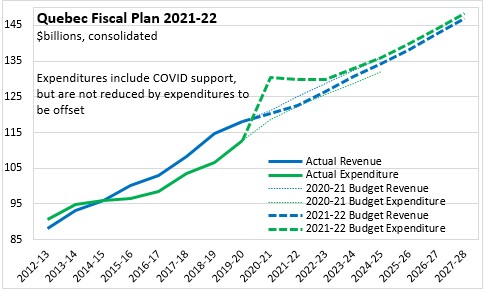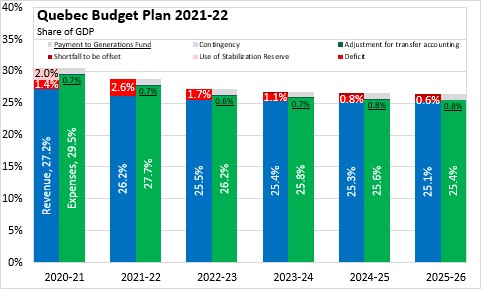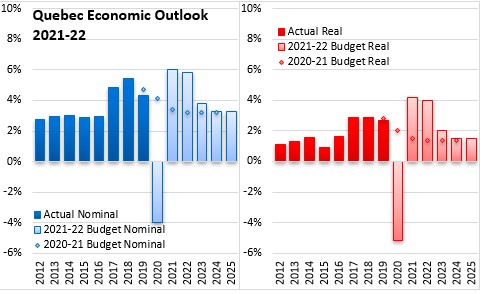The Economics and Statistics Division maintains archives of previous publications for accountability purposes, but makes no updates to keep these documents current with the latest data revisions from Statistics Canada. As a result, information in older documents may not be accurate. Please exercise caution when referring to older documents. For the latest information and historical data, please contact the individual listed to the right.
<--- Return to Archive
For additional information relating to this article, please contact:
March 26, 2021QUEBEC BUDGET 2021-22 The government of Quebec has released its 2021-22 Budget, anticipating a deficit of $12.3 billion alongside a contribution of $3.1 billion to the Generations Fund. Quebec's deficit was $6.2 billion in 2020-21, after an $8.8 billion contribution from the Stabilization Reserve. Quebec's deficits are projected to narrow in the coming years, after payments made to the Generations Fund. However, starting in 2023-24, the deficit projections are contingent on offsetting shortfalls rising from $1.3 billion to $6.5 billion.

Quebec's fiscal plan in 2020-21 was presented just at the start of the COVID-19 pandemic and did not incorporate any associated impacts on revenues and expenditures. COVID-19 resulted in a sharp increase in expenditures and a decline in revenues. As the pandemic eases, revenues are expected to return to trends, though expenditures remain higher (including shortfalls to be offset).

Quebec's previous plans anticipated surpluses which are then contributed to the Generations Fund. Quebec maintains its commitment to make contributions to the Generations Fund over the fiscal plan. The balances shown below are before making contributions to the Generations Fund. Until 2027-28, Quebec anticipates deficits after making its contribution to the Generations Fund ($0 balance after paying into the Generations Fund in 2027-28).

The footprint of the Quebec government in the economy (greater of revenues and expenditures measured as a share of GDP) increaed to 29.5% in 2020-21. Over time, this is projected to shrink as the economy recovers - falling to 25.4% by 2025-26. Quebec's budget deficit is projected to be 2.6% of GDP in 2021-22, though this includes a 0.7% contribution to the Generations Fund.
Quebec's net debt-to-GDP ratio is forecast to be 45.0% in 2020-21, up from 39.9% in 2019-20. The debt-to-GDP ratio is projected to peak at 45.5% in 2021-22, before falling slowing to 43.4% by 2025-26.

The shock from the COVID-19 pandemic was not anticipated in the 2020-21 economic outlook. Quebec's real GDP is estimated to have declined by 5.2% in 2020. Growth is projected to rebound by 4.2% in 2021 and by 4.0% in 2022 as household spending, investment and government expenditures return to growth. A faster rise in imports than exports is expected to offset some of the rise in domestic spending. The economic recovery is contingent on easing restrictions as vaccination builds population immunity. Over the medium term, the Quebec Budget assumes a full economic recovery, though this outlook is tempered by a high degree of uncertainty.

Key Measures and Initiatives
Quebec's Budget focuses on building resilience and confidence.
- Investments of $10.3 billion are planned to strengthen the health care system.
- Providing $1.5 billion in additional support for youth and education through 2025-2026
- $4.0 billion to spur investment, increase productivity in all regions and accelerate transition to a new economy
- Providing $1.0 billion by 2025-2026 for social housing and assistance for vulnerable persons
- Collect Quebec Sales Tax on goods from abroad supplied through fulfillment warehouses
- Only closing the budgetary deficit once Quebec has returned to full employment
Quebec Budget 2021-22
<--- Return to Archive